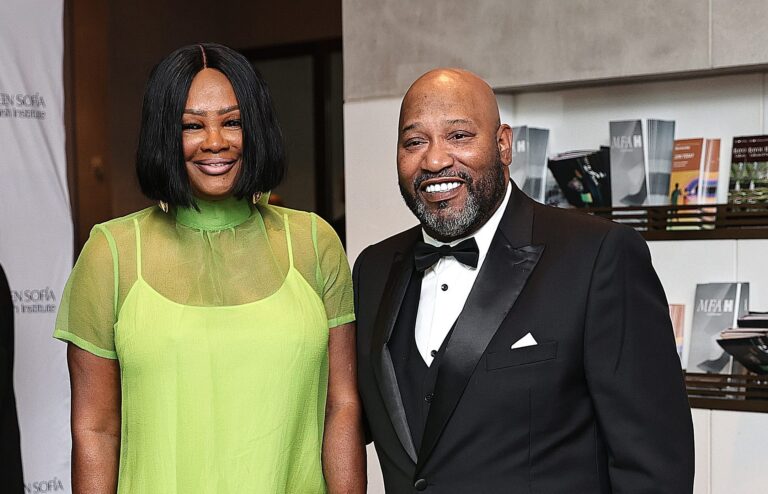BBC Breakfast boss Richard Frediani is facing further allegations of workplace bullying and misconduct, with senior presenter Naga Munchetty among those thought to have misgivings about his behavior.
Deadline revealed last month how Frediani was the subject of at least two misconduct complaints, including one from a woman who had her grievance upheld after claiming that the Breakfast editor physically shook her during a newsroom exchange last year.
Now, Deadline can report that concerns about Frediani’s conduct run deeper at the BBC, while he has also been accused of behaving inappropriately at his previous employer, ITN, where he was overseen by the same executives now running BBC News. The BBC declined to comment on individual HR matters. Frediani’s position is that he was unaware of any complaints being made about his conduct at ITN.
After nine of Frediani’s colleagues spoke to Deadline for our original investigation, a further 11 people have come forward to discuss their experiences. Seven of these individuals worked with Frediani at ITN, where he held senior roles on the team that produces ITV News. We can reveal:
- Several sources said Breakfast presenter Naga Munchetty has raised concerns with BBC bosses about Frediani’s conduct. Tina Daheley, another senior presenter, has chosen not to appear on News at One, the flagship bulletin that Frediani also edits.
- Current and former ITN employees said they felt Frediani was a “bully,” who would shout, swear at, and intimidate colleagues. Sources claimed complaints were made about his conduct.
- Deborah Turness and Jonathan Munro, BBC News’ two most senior executives, oversaw Frediani at ITN and sources claimed they were aware of his reputation. Neither could recall any complaints being made about Frediani at ITN.
- After Deadline’s original story, Breakfast employees were told that misconduct allegations would be treated seriously, but some are dubious that action will be taken because of Frediani’s status at BBC News.
The allegations come as the BBC prepares to publish an external review of its workplace culture later this month, following a series of scandals about the conduct of powerful men. BBC director general Tim Davie has said he wants Change Associates, the management consultancy leading the review, to make practical recommendations about how managers can create a culture where there is “zero tolerance” for wrongdoing. Davie told lawmakers last month that the BBC has improved its complaints handling and staff are more confident in processes, but he said that if there are examples of concerns not being treated seriously, it is a “grade one” issue.
Presenter Concerns
Four people familiar with the tensions over Frediani said Munchetty, one of Breakfast’s most prominent hosts, has an uneasy relationship with her editor and has spoken to BBC News managers about her concerns. A journalist at a rival news organization said she is “quite open” about her disquiet regarding his treatment of Breakfast employees. Munchetty did not respond to requests for comment.

Naga Munchetty
Separately, three sources said Radio 2 newsreader Tina Daheley has chosen not to appear on Frediani’s News at One. She was named as a presenter on the bulletin last May, but is said to have been deeply upset by how her appointment was announced.
A press release unveiling News at One’s presenting line-up featured images of all the white news anchors but did not picture Daheley, per an archived web page. The BBC press office took full responsibility for the error, which was quickly corrected after Daheley voiced her dismay. A source said Frediani, who was quoted in the press release, did not see the final version before it was published on the BBC website. He later apologized to Daheley. Daheley did not respond to requests for comment.
Munchetty and Daheley have each worked at the BBC for more than 17 years and both feature among the corporation’s highest-paid presenters. Munchetty juggles her Breakfast duties with Radio 5 Live, while Daheley also hosts Points of View and News at Six.
Other BBC employees came forward with their experiences. One person claimed to have witnessed an incident in 2019, during which a “clearly angry” Frediani cornered a Breakfast colleague up against a wall and was “jabbing his finger” as he voiced displeasure about that morning’s show. Two sources alleged that Frediani is known for “screaming” down the phone at other BBC News desks and complaining about the quality of content they supply Breakfast.
In the period after Deadline’s first story about Frediani, insiders said that he has behaved as if it is business as usual. The day after publication, Breakfast and News at One staff were emailed by John McAndrew, BBC News’ director of programmes, to remind them about the corporation’s approach to complaints of wrongdoing.
“With regard to culture and behaviour – and this stands for all of our teams across the organisation – please be assured that if, or when, any allegations of any inappropriate behaviour come to me, they will be taken seriously, comprehensively investigated, and if upheld, action will be taken,” McAndrew wrote.
Some at Breakfast were dubious about this message given that Frediani has been the subject of complaints, and yet has been rewarded with more power. Bosses knew that Frediani had been accused of shaking a female colleague last year before they expanded his responsibilities to include the News at One. “Senior management has been repeatedly told by various people that there is a problem, and they haven’t done anything about it,” said a BBC source.
“Tyrant On The Shop Floor”
Seven of Frediani’s former ITN colleagues, who spoke to Deadline on the condition of anonymity, recounted their experiences of his behavior. He did two spells at ITN, lasting a total of nearly 14 years, the most recent of which was between 2012 and 2019, when he left to join BBC Breakfast.
Characterized as a “tyrant on the shop floor,” former colleagues said Frediani ran the newsroom with “unbridled aggression,” creating a culture of fear among those around him, including his superiors. ITN declined to comment on historical allegations about Frediani.
Those interviewed by Deadline alleged that he would undermine colleagues in editorial meetings by muttering and swearing under his breath, taking assignments away from journalists he did not rate, and openly smirking or rolling his eyes at story suggestions that did not meet his standards. “It would be a public humiliation exercise, right in the middle of the office,” said one person privy to the meetings.
Others recalled him having stand-up rows, shouting, swearing, and jabbing his finger in the direction of co-workers. “He was accustomed to getting into your personal space when talking to you, leaning into you, perhaps inches away from your face, or touching you to make a point,” a former colleague recalled.
Sources alleged that he routinely ignored or sidelined colleagues he considered “persona non grata,” stripping them of responsibility or freezing them out of desirable stories. Sources said this was because Frediani did not personally rate the individual or had previously clashed with them. “In isolation, it doesn’t sound hugely significant … but it had such a toxic effect on people,” said another former ITN insider.
The allegations echoed those made by BBC insiders, who shared stories about his alleged aggression and lamented the “clubbable” atmosphere he has created at Breakfast, in which favorites are rewarded and others are left out in the cold. There is a feeling that his behavior does not accord with BBC values around fairness and inclusivity.
Several of Frediani’s former ITN co-workers said complaints were made about his conduct, though it is not clear how formal these grievances were. One person told Deadline that they made a complaint to a manager and HR about Frediani’s behavior, but were told to get used to his style.
Others said they stopped short of complaining because they worried it would not be dealt with seriously by ITN or it could be damaging for their career. “If I’d made a formal complaint, it would have fallen on deaf ears, and I’d have been slowly squeezed out,” said one person.

Deborah Turness
Frediani was a programme editor at ITV News in Deborah Turness’ final year as overall editor of the service before she joined NBC News. Jonathan Munro, now BBC News’ global news director, also worked in a senior role at ITV News during this time. “Turness is fully aware of what he is like,” said one person. Another source, a seasoned journalist, claimed that “a blind eye” had been turned to Frediani’s alleged conduct.
Turness’ position is that she does not recall any complaint, formal or informal, about Frediani during the time they overlapped at ITN. Munro was also unaware of complaints and strongly denies that a “blind eye” was turned to any alleged misconduct. Frediani’s position is that he was unaware of any complaints about his conduct and nothing was raised with him.
ITN is currently facing questions over its handling of historical complaints and use of non-disclosure agreements after an independent report concluded last year that employees had “low trust” in management processes. Deadline can reveal that the company recently engaged People Puzzles, an external HR consultancy, to improve its people management and complaints processes. Staff have recently been surveyed about their experiences.
An ITN spokesperson said: “We are committed to a culture of openness and trust, which includes ensuring that any time a concern is raised, it is addressed promptly, thoroughly, and fairly.”
WHO IS RICHARD FREDIANI?
Described as one of the most formidable British TV news editors of his generation, Richard Frediani has risen from being a local radio reporter in his native city of Preston to the BBC’s most powerful news executive outside of London.Based out of Salford, Frediani has called the shots on BBC Breakfast, the UK’s highest-rated morning show, since September 2019. He recently had his role expanded to include the flagship News at One. He is said to have an instinctive understanding of audiences outside of London, a much-prized skill at the BBC, which is often accused of being biased towards the capital.
Captain Tom Moore
Frediani is known as a news obsessive. An ITN colleague recalled how he used to record the weekday news bulletins of his rivals and watch them back at the weekend while doing the family’s ironing. Fueled by a love of sweet treats, Frediani is a near-constant presence in the office and asks his team to pitch stories that make viewers late for work because they are so compelling to watch.
He has fashioned Breakfast into a show that seeks to set the agenda with human interest stories, such as propelling Captain Tom Moore into the national consciousness by spotlighting his pandemic heroics. Colleagues have called him a “campaigning” editor, who doubles down on issues that strike a chord with audiences. Breakfast’s coverage of the Post Office scandal is evidence of this and earned the show its first-ever BAFTA TV Awards nomination last month. Breakfast has won a Royal Television Society award on Frediani’s watch.
Those who have worked with Frediani claimed his skills and track record are the reasons why his superiors have been prepared to overlook behavior that allegedly upsets some colleagues. There is also the view that he has built a unique empire in Salford and is not subject to same managerial oversight as his London-based contemporaries.





 Captain Tom Moore
Captain Tom Moore



